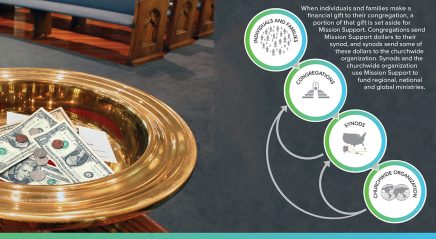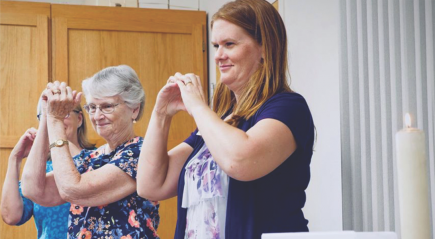Mention “stewardship” at church and you’re likely to see a lot of eyes rolling and hear some deep groans—just before people bolt for the door with one hand on their wallets and checkbooks. That’s because, in too many congregations, “stewardship” has become a cheesy euphemism for “We want your money.”
It’s a shame too. As our church’s traditional offering prayers express, stewardship lies at the very center of what it means to be a disciple of Jesus.
“Stewardship is everything we do after we say, ‘I believe,’” said Clarence Stoughton (1895-1975), who served as executive secretary of the Lutheran Laymen’s Movement for Stewardship and as secretary of stewardship for the United Lutheran Church in America, an ELCA predecessor. An internationally known educator, Stoughton served as president of both Wagner College, New York City, and Wittenberg University, Springfield, Ohio.
His definition of stewardship, which has become something of a mantra for Christian stewardship leaders in North America (just Google it), becomes clear when two key elements are understood.
First, a “steward” is a person of authority who is entrusted with the duty of managing and caring for another person’s property. More than a mere employee, a steward is endowed with a great degree of autonomy, trust and responsibility.
For example, in Jesus’ parable in Luke 16:1-13, the steward misuses his power and changes the amounts due on his master’s accounts payable. Christians know him as “the dishonest” steward because he betrays his master’s trust and cheats him for his own gain.
Second, Stoughton’s definition relies on the biblical understanding that everything in creation, even our lives, belongs to God. No exceptions.
Genesis 1:26-28 and 2:15 describe how God created human beings in the divine image and put us in charge of what God has made. Thus, we are stewards—caretakers, managers, supervisors—given a high degree of authority and autonomy, but also commensurate responsibility. Our task as stewards represents a sacred trust and solemn duty. We carry it out in everything we think, say and do after we say, “I believe.”
This idea of faithful stewardship should ring familiar to Lutherans, who hear the traditional offering prayer in the weekly worship liturgy of our standard hymnals, Evangelical Lutheran Worship (2006) and the Lutheran Book of Worship (1978).
An in-depth exploration of these prayers reveals the life-giving connection between stewardship, offering and discipleship. The wording is slightly different between the two hymnals, so what follows is a compilation of the best of both.
Blessed are you, O God, Maker of all things …
The first verse of the Bible frames our foundational understanding not only of stewardship but also of reality itself: “In the beginning when God created the heavens and the earth” (Genesis 1:1). How did the world get here? How did we? What’s behind everything? It’s God, who is holy and blessed. Everything is imbued with God’s holiness, and everything belongs to God.
“The earth is the Lord’s and all that is in it, the world, and those who live in it,” reads Psalm 24:1, echoing the theme of God’s ownership. In case we thought it was only the “stuff” that belongs to God, this verse makes clear that we ourselves belong to God. Paul emphasizes this in Romans 14:8: “If we live, we live to the Lord, and if we die, we die to the Lord; so then, whether we live or whether we die, we are the Lord’s.”
We offer with joy and thanksgiving …
The word “offer” captures the essence of faithful steward giving, implying free choice and a willing heart. By contrast, no one would consider a tax payment to the federal government an “offering.” Even if we consider our taxes a fair price for living in a free country, writing checks to the IRS is mandated by law and failing to do so carries harsh penalties.
That’s not how God rolls. We offer freely, without expectation of reward, and withhold offerings without fear of punishment. And it’s not just our money we offer to God, but the totality of what we are, as expressed in the hymn “We Are an Offering” (ELW, 692):
“We lift our voices, we lift our hands, we lift our lives up to you; we are an offering.”
We offer as happy and contented people, knowing that God provides all we have and all we need. This knowledge fills us with gratitude. “God loves a cheerful giver,” Paul writes in 2 Corinthians 9:7, adding in the next verse, “And God is able to provide you with every blessing in abundance, so that by always having enough of everything, you may share abundantly in every good work.”
What you have first given us …
God is the source of all our blessings. We cannot and should not take credit for anything we have. As Deuteronomy 8:17-18 warns people who are rich, “Do not say to yourself, ‘My power and the might of my own hand have gotten me this wealth.’ But remember the Lord your God, for it is he who gives you power to get wealth.”
Similarly, remembering that God is the creator of all, we would be wise to avoid regarding our possessions and our lives as ours to use as we wish. God’s people often refer to our blessings as “gifts,” but this is misleading, says Charles Lane, a Lutheran stewardship expert, author and speaker.
“With God, there is no transfer of ownership. God is still the owner,” Lane remarks in Embracing Stewardship: How to Put Stewardship at the Heart of Your Congregation’s Life, which he co-wrote with Grace Duddy Pomroy in 2016. “We should quit using the ‘gift’ language in favor of language such as ‘trust.’ Everything we have is a trust from God, placed by God into our care and management.”
Our selves …
“Know that the Lord is God. It is he that made us, and we are his; we are his people, and the sheep of his pasture” (Psalm 100:3).
Because we are God’s holy creations, all our energies are designed for godly purposes in service to the neighbor. “For we are what he has made us, created in Christ Jesus for good works, which God prepared beforehand to be our way of life,” Paul writes in Ephesians 2:10.
“I appointed you to go and bear fruit, fruit that will last,” Jesus tells his disciples in John 15:16. Paul enumerates fruits of the spirit as “love, joy, peace, patience, kindness, generosity, faithfulness, gentleness, and self-control” (Galatians 5:22-23).
This aspect of offering illustrates the magnificent paradox of true spiritual offering, where our giving doesn’t diminish what we have but actually increases it.
“For those who want to save their life will lose it, and those who lose their life for my sake will find it,” Jesus says in Matthew 16:25. The more we offer ourselves to God, the more we are blessed.
“For surely I know the plans I have for you, says the Lord, plans for your welfare and not for harm, to give you a future with hope” (Jeremiah 29:11).
Our time …
From birth to death marks a finite span of days in which we live, breathe and have our lives. Each moment is precious, as Psalm 90:12 makes clear: “Teach us to count our days, that we may gain a wise heart.”
How we spend our time may be the most crucial stewardship question of all. After all, income levels and talents differ widely by individual, but everyone is given the same number of minutes and hours in a day. How we use them says a lot about our priorities and values.
When we choose to give our time to church, to neighbor, to a ministry that works for God’s purposes, we are stewarding our time wisely.
Our possessions …
Whether we cut a $100,000 check for the building fund or place a box of macaroni and cheese in the bin for the food pantry, we give out of the material abundance with which God has entrusted us, knowing that generosity blesses not only the recipient but also the giver.
“It is more blessed to give than to receive,” Jesus is quoted as saying in Acts 20:35. We receive many blessings when we give financially—including the satisfaction of helping others or contributing to a worthy cause—but the greatest benefit may be how it changes us.
In giving financially, we break money’s powerful connection to our self-interest. In giving, we learn to be generous-hearted people who can more easily love their neighbor as themselves. This is an especially important lesson for those who are well-off.
For those who don’t have material possessions to spare, the church follows Jesus’ teaching, made clear in the story of the widow’s mite (Mark 12:41-44)—that all offerings, no matter how small, are treasured and valued. For those whose financial situation prevents them from giving monetarily, the church values and welcomes offerings of time and talent.
Signs of your gracious love …
“God is love.” Though the loving character of the Almighty is revealed throughout the Bible, 1 John declares it plainly, twice (4:8 and 16). Moreover, the iconic Gospel verse John 3:16 begins “For God so loved the world.”
Since God is love, all that God does is done in love, and God’s love permeates creation. Therefore, we can readily observe God’s gracious love in all that we are, all that we see and all that we experience.
We would be misreading this line if we inferred that wealth is a sign of God’s favor, because then the opposite would also be true—that poverty is a sign of God’s disfavor. In fact, the Bible is clear that God holds the poor in special regard and that wealth can bring spiritual challenges. In Luke 6, Jesus says, “Blessed are you who are poor, for yours is the kingdom of God” (20) and “Woe to you who are rich, for you have received your consolation” (24).
Use us and what we have gathered …
As people dedicated—heart, soul and possessions—to God’s purposes, we put all we have and all we are in the service of God, trusting that the Spirit will give us direction and guidance.
The ELCA’s slogan says it simply: “God’s work. Our hands.” But author and mystic Teresa of Ávila explained it beautifully in the 16th century:
“Christ has no body on earth but yours. No hands, no feet on earth but yours. Yours are the eyes with which he looks compassionately on this world. Yours are the feet with which he walks to do good. Yours are the hands with which he blesses all the world. … Christ has no body now on earth but yours.”
In feeding the world with your love …
The world hungers for so many things, including food, peace, companionship, clothing, education, safety, medical care, housing and relationship with God and God’s people. All these important needs fall under the umbrella of God’s love.
These needs also fall under the mission mandate that our congregations are fulfilling across town and across the world. When we give to our congregation, our synod or our churchwide ministries, we feed the world with God’s love.
Through the one who gave himself for us, Jesus Christ, our Savior and Lord.
Jesus models for us self-giving for the sake of others. It’s through Christ and in his name that we joyfully and thankfully offer ourselves.
The offering prayers we say every week in worship help us understand afresh that stewardship is more than whether we give our money to God’s mission in the world. It’s how we use every good blessing that God has entrusted to us on our journey of faith.
Again, as Stoughton wisely remarked, “Stewardship is everything we do after we say, ‘I believe.’”










